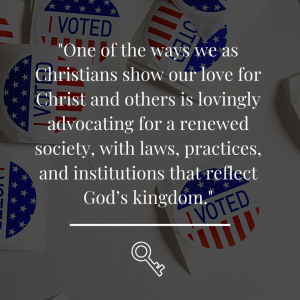
Looking around our world today, it’s easy to see that many of our systems are broken. The Bible shows us, though, that Christians shouldn’t be afraid of transformative social change.
As Christians, we must remember that God not only hates sin in individuals, but also the sin that invades our governments, organizations, and other institutions and structures. In Isaiah 10, the prophet tells us that we are judged based on “unjust laws” and “oppressive decrees” just as we are judged for personal greed, pride, or prejudice.
This sentiment is echoed time and time again, particularly by the Old Testament prophets who chastise Israel for both their lack of care for the most vulnerable and for their broken system that caused such poverty. Amos 5:10-15 laments corrupt courts and tax systems; Micah 2:1-5 condemns property divisions based on power rather than God’s instructions; Malachi 3:5 calls out a whole host of systemic injustices against laborers, widows, orphans, and immigrants. Sound familiar?
Looking around our world today, it’s easy to see that many of our systems are broken. COVID-19, for instance, has thrown a harsh light on many public systems–healthcare institutions have proved underfunded and unprepared for such a crisis, inequalities in public education have been exacerbated as students struggle to access classes and resources, and our government has often failed to be transparent and communicative with its citizens.
The Bible shows us, though, that Christians shouldn’t be afraid of transformative social change, offering us examples like The Year of Jubilee, a “reset” year for all of Israel that included society-wide forgiveness of debts, returning of borrowed property, releasing of slaves, reunification of separated families, and rest for all the natural land–basically a complete upheaval of Jewish society. Though we don’t still practice those specific Old Testament laws, one of the ways we as Christians show our love for Christ and others is lovingly advocating for a renewed society, with laws, practices, and institutions that reflect God’s kingdom.

Looking around our world today, it’s easy to see that many of our systems are broken. The Bible shows us, though, that Christians shouldn’t be afraid of transformative social change.
As Christians, we must remember that God not only hates sin in individuals, but also the sin that invades our governments, organizations, and other institutions and structures. In Isaiah 10, the prophet tells us that we are judged based on “unjust laws” and “oppressive decrees” just as we are judged for personal greed, pride, or prejudice.
This sentiment is echoed time and time again, particularly by the Old Testament prophets who chastise Israel for both their lack of care for the most vulnerable and for their broken system that caused such poverty. Amos 5:10-15 laments corrupt courts and tax systems; Micah 2:1-5 condemns property divisions based on power rather than God’s instructions; Malachi 3:5 calls out a whole host of systemic injustices against laborers, widows, orphans, and immigrants. Sound familiar?
Looking around our world today, it’s easy to see that many of our systems are broken. COVID-19, for instance, has thrown a harsh light on many public systems–healthcare institutions have proved underfunded and unprepared for such a crisis, inequalities in public education have been exacerbated as students struggle to access classes and resources, and our government has often failed to be transparent and communicative with its citizens.
The Bible shows us, though, that Christians shouldn’t be afraid of transformative social change, offering us examples like The Year of Jubilee, a “reset” year for all of Israel that included society-wide forgiveness of debts, returning of borrowed property, releasing of slaves, reunification of separated families, and rest for all the natural land–basically a complete upheaval of Jewish society. Though we don’t still practice those specific Old Testament laws, one of the ways we as Christians show our love for Christ and others is lovingly advocating for a renewed society, with laws, practices, and institutions that reflect God’s kingdom.
As Christians, we must remember that God not only hates sin in individuals, but also the sin that invades our governments, organizations, and other institutions and structures. In Isaiah 10, the prophet tells us that we are judged based on “unjust laws” and “oppressive decrees” just as we are judged for personal greed, pride, or prejudice.
This sentiment is echoed time and time again, particularly by the Old Testament prophets who chastise Israel for both their lack of care for the most vulnerable and for their broken system that caused such poverty. Amos 5:10-15 laments corrupt courts and tax systems; Micah 2:1-5 condemns property divisions based on power rather than God’s instructions; Malachi 3:5 calls out a whole host of systemic injustices against laborers, widows, orphans, and immigrants. Sound familiar?
Looking around our world today, it’s easy to see that many of our systems are broken. COVID-19, for instance, has thrown a harsh light on many public systems–healthcare institutions have proved underfunded and unprepared for such a crisis, inequalities in public education have been exacerbated as students struggle to access classes and resources, and our government has often failed to be transparent and communicative with its citizens.
The Bible shows us, though, that Christians shouldn’t be afraid of transformative social change, offering us examples like The Year of Jubilee, a “reset” year for all of Israel that included society-wide forgiveness of debts, returning of borrowed property, releasing of slaves, reunification of separated families, and rest for all the natural land–basically a complete upheaval of Jewish society. Though we don’t still practice those specific Old Testament laws, one of the ways we as Christians show our love for Christ and others is lovingly advocating for a renewed society, with laws, practices, and institutions that reflect God’s kingdom.
